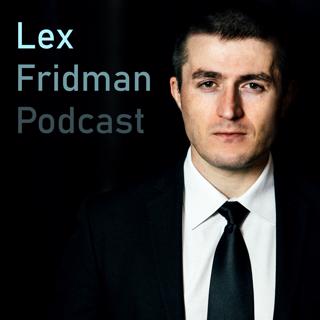
Whitney Cummings: Comedy, Robotics, Neurology, and Love
Whitney Cummings is a stand-up comedian, actor, producer, writer, director, and the host of a new podcast called Good for You. Her most recent Netflix special called “Can I Touch It?” features in part a robot, she affectionately named Bearclaw, that is designed to be visually a replica of Whitney. It’s exciting for me to see one of my favorite comedians explore the social aspects of robotics and AI in our society. She also has some fascinating ideas about human behavior, psychology, and neurology, some of which she explores in her book called “I’m Fine…And Other Lies.” This conversation is part of the Artificial Intelligence podcast. If you would like to get more information about this podcast go to https://lexfridman.com/ai or connect with @lexfridman on Twitter, LinkedIn, Facebook, Medium, or YouTube where you can watch the video versions of these conversations. If you enjoy the podcast, please rate it 5 stars on Apple Podcasts or support it on Patreon. This episode is presented by Cash App. Download it (App Store, Google Play), use code “LexPodcast”. The episode is also supported by ZipRecruiter. Try it: http://ziprecruiter.com/lexpod Here’s the outline of the episode. On some podcast players you should be able to click the timestamp to jump to that time. 00:00 – Introduction 03:51 – Eye contact 04:42 – Robot gender 08:49 – Whitney’s robot (Bearclaw) 12:17 – Human reaction to robots 14:09 – Fear of robots 25:15 – Surveillance 29:35 – Animals 35:01 – Compassion from people who own robots 37:55 – Passion 44:57 – Neurology 56:38 – Social media 1:04:35 – Love 1:13:40 – Mortality
5 Joulu 20191h 17min

Ray Dalio: Principles, the Economic Machine, Artificial Intelligence & the Arc of Life
Ray Dalio is the founder, Co-Chairman and Co-Chief Investment Officer of Bridgewater Associates, one of the world’s largest and most successful investment firms that is famous for the principles of radical truth and transparency that underlie its culture. Ray is one of the wealthiest people in the world, with ideas that extend far beyond the specifics of how he made that wealth. His ideas, applicable to everyone, are brilliantly summarized in his book Principles. This conversation is part of the Artificial Intelligence podcast. If you would like to get more information about this podcast go to https://lexfridman.com/ai or connect with @lexfridman on Twitter, LinkedIn, Facebook, Medium, or YouTube where you can watch the video versions of these conversations. If you enjoy the podcast, please rate it 5 stars on Apple Podcasts or support it on Patreon. This episode is presented by Cash App. Download it (App Store, Google Play), use code “LexPodcast”. Here’s the outline of the episode. On some podcast players you should be able to click the timestamp to jump to that time. 00:00 – Introduction 02:56 – Doing something that’s never been done before 08:39 – Shapers 13:28 – A Players 15:09 – Confidence and disagreement 17:10 – Don’t confuse dilusion with not knowing 24:38 – Idea meritocracy 27:39 – Is credit good for society? 32:59 – What is money? 37:13 – Bitcoin and digital currency 41:01 – The economic machine is amazing 46:24 – Principle for using AI 58:55 – Human irrationality 1:01:31 – Call for adventure at the edge of principles 1:03:26 – The line between madness and genius 1:04:30 – Automation 1:07:28 – American dream 1:14:02 – Can money buy happiness? 1:19:48 – Work-life balance and the arc of life 1:28:01 – Meaning of life
2 Joulu 20191h 30min

Noam Chomsky: Language, Cognition, and Deep Learning
Noam Chomsky is one of the greatest minds of our time and is one of the most cited scholars in history. He is a linguist, philosopher, cognitive scientist, historian, social critic, and political activist. He has spent over 60 years at MIT and recently also joined the University of Arizona. This conversation is part of the Artificial Intelligence podcast. If you would like to get more information about this podcast go to https://lexfridman.com/ai or connect with @lexfridman on Twitter, LinkedIn, Facebook, Medium, or YouTube where you can watch the video versions of these conversations. If you enjoy the podcast, please rate it 5 stars on Apple Podcasts or support it on Patreon. This episode is presented by Cash App. Download it (App Store, Google Play), use code “LexPodcast”. Here’s the outline of the episode. On some podcast players you should be able to click the timestamp to jump to that time. 00:00 – Introduction 03:59 – Common language with an alience species 05:46 – Structure of language 07:18 – Roots of language in our brain 08:51 – Language and thought 09:44 – The limit of human cognition 16:48 – Neuralink 19:32 – Deepest property of language 22:13 – Limits of deep learning 28:01 – Good and evil 29:52 – Memorable experiences 33:29 – Mortality 34:23 – Meaning of life
29 Marras 201936min

Gilbert Strang: Linear Algebra, Deep Learning, Teaching, and MIT OpenCourseWare
Gilbert Strang is a professor of mathematics at MIT and perhaps one of the most famous and impactful teachers of math in the world. His MIT OpenCourseWare lectures on linear algebra have been viewed millions of times. This conversation is part of the Artificial Intelligence podcast. If you would like to get more information about this podcast go to https://lexfridman.com/ai or connect with @lexfridman on Twitter, LinkedIn, Facebook, Medium, or YouTube where you can watch the video versions of these conversations. If you enjoy the podcast, please rate it 5 stars on Apple Podcasts or support it on Patreon. This episode is presented by Cash App. Download it, use code LexPodcast. And it is supported by ZipRecruiter. Try it: http://ziprecruiter.com/lexpod Here’s the outline of the episode. On some podcast players you should be able to click the timestamp to jump to that time. 00:00 – Introduction 03:45 – Math rockstar 05:10 – MIT OpenCourseWare 07:29 – Four Fundamental Subspaces of Linear Algebra 13:11 – Linear Algebra vs Calculus 15:03 – Singular value decomposition 19:47 – Why people like math 23:38 – Teaching by example 25:04 – Andrew Yang 26:46 – Society for Industrial and Applied Mathematics 29:21 – Deep learning 37:28 – Theory vs application 38:54 – Open problems in mathematics 39:00 – Linear algebra as a subfield of mathematics 41:52 – Favorite matrix 46:19 – Advice for students on their journey through math 47:37 – Looking back
25 Marras 201950min

Dava Newman: Space Exploration, Space Suits, and Life on Mars
Dava Newman is the Apollo Program professor of AeroAstro at MIT and the former Deputy Administrator of NASA and has been a principal investigator on four spaceflight missions. Her research interests are in aerospace biomedical engineering, investigating human performance in varying gravity environments. She has developed a space activity suit, namely the BioSuit, which would provide pressure through compression directly on the skin via the suit’s textile weave, patterning, and materials rather than with pressurized gas. This conversation is part of the Artificial Intelligence podcast. If you would like to get more information about this podcast go to https://lexfridman.com/ai or connect with @lexfridman on Twitter, LinkedIn, Facebook, Medium, or YouTube where you can watch the video versions of these conversations. If you enjoy the podcast, please rate it 5 stars on Apple Podcasts or support it on Patreon. This episode is presented by Cash App. Download it, use code LexPodcast. You get $10 and $10 is donated to FIRST, one of my favorite nonprofit organizations that inspires young minds through robotics and STEM education. Here’s the outline of the episode. On some podcast players you should be able to click the timestamp to jump to that time. 00:00 – Introduction 03:11 – Circumnavigating the globe by boat 05:11 – Exploration 07:17 – Life on Mars 11:07 – Intelligent life in the universe 12:25 – Advanced propulsion technology 13:32 – The Moon and NASA’s Artemis program 19:17 – SpaceX 21:45 – Science on a CubeSat 23:45 – Reusable rockets 25:23 – Spacesuit of the future 32:01 – AI in Space 35:31 – Interplanetary species 36:57 – Future of space exploration
22 Marras 201939min

Michael Kearns: Algorithmic Fairness, Bias, Privacy, and Ethics in Machine Learning
Michael Kearns is a professor at University of Pennsylvania and a co-author of the new book Ethical Algorithm that is the focus of much of our conversation, including algorithmic fairness, bias, privacy, and ethics in general. But, that is just one of many fields that Michael is a world-class researcher in, some of which we touch on quickly including learning theory or theoretical foundations of machine learning, game theory, algorithmic trading, quantitative finance, computational social science, and more. This conversation is part of the Artificial Intelligence podcast. If you would like to get more information about this podcast go to https://lexfridman.com/ai or connect with @lexfridman on Twitter, LinkedIn, Facebook, Medium, or YouTube where you can watch the video versions of these conversations. If you enjoy the podcast, please rate it 5 stars on Apple Podcasts or support it on Patreon. This episode is sponsored by Pessimists Archive podcast. Here’s the outline with timestamps for this episode (on some players you can click on the timestamp to jump to that point in the episode): 00:00 – Introduction 02:45 – Influence from literature and journalism 07:39 – Are most people good? 13:05 – Ethical algorithm 24:28 – Algorithmic fairness of groups vs individuals 33:36 – Fairness tradeoffs 46:29 – Facebook, social networks, and algorithmic ethics 58:04 – Machine learning 58:05 – Machine learning 59:19 – Algorithm that determines what is fair 1:01:25 – Computer scientists should think about ethics 1:05:59 – Algorithmic privacy 1:11:50 – Differential privacy 1:19:10 – Privacy by misinformation 1:22:31 – Privacy of data in society 1:27:49 – Game theory 1:29:40 – Nash equilibrium 1:30:35 – Machine learning and game theory 1:34:52 – Mutual assured destruction 1:36:56 – Algorithmic trading 1:44:09 – Pivotal moment in graduate school
19 Marras 20191h 49min

Elon Musk: Neuralink, AI, Autopilot, and the Pale Blue Dot
Elon Musk is the CEO of Tesla, SpaceX, Neuralink, and a co-founder of several other companies. This is the second time Elon has been on the podcast. You can watch the first time on YouTube or listen to the first time on its episode page. You can read the transcript (PDF) here. This conversation is part of the Artificial Intelligence podcast. If you would like to get more information about this podcast go to https://lexfridman.com/ai or connect with @lexfridman on Twitter, LinkedIn, Facebook, Medium, or YouTube where you can watch the video versions of these conversations. If you enjoy the podcast, please rate it 5 stars on Apple Podcasts or support it on Patreon. Here’s the outline with timestamps for this episode (on some players you can click on the timestamp to jump to that point in the episode): 00:00 – Introduction 01:57 – Consciousness 05:58 – Regulation of AI Safety 09:39 – Neuralink – understanding the human brain 11:53 – Neuralink – expanding the capacity of the human mind 17:51 – Neuralink – future challenges, solutions, and impact 24:59 – Smart Summon 27:18 – Tesla Autopilot and Full Self-Driving 31:16 – Carl Sagan and the Pale Blue Dot
12 Marras 201936min

Bjarne Stroustrup: C++
Bjarne Stroustrup is the creator of C++, a programming language that after 40 years is still one of the most popular and powerful languages in the world. Its focus on fast, stable, robust code underlies many of the biggest systems in the world that we have come to rely on as a society. If you’re watching this on YouTube, many of the critical back-end component of YouTube are written in C++. Same goes for Google, Facebook, Amazon, Twitter, most Microsoft applications, Adobe applications, most database systems, and most physical systems that operate in the real-world like cars, robots, rockets that launch us into space and one day will land us on Mars. This conversation is part of the Artificial Intelligence podcast. If you would like to get more information about this podcast go to https://lexfridman.com/ai or connect with @lexfridman on Twitter, LinkedIn, Facebook, Medium, or YouTube where you can watch the video versions of these conversations. If you enjoy the podcast, please rate it 5 stars on Apple Podcasts or support it on Patreon. Here’s the outline with timestamps for this episode (on some players you can click on the timestamp to jump to that point in the episode): 00:00 – Introduction 01:40 – First program 02:18 – Journey to C++ 16:45 – Learning multiple languages 23:20 – Javascript 25:08 – Efficiency and reliability in C++ 31:53 – What does good code look like? 36:45 – Static checkers 41:16 – Zero-overhead principle in C++ 50:00 – Different implementation of C++ 54:46 – Key features of C++ 1:08:02 – C++ Concepts 1:18:06 – C++ Standards Process 1:28:05 – Constructors and destructors 1:31:52 – Unified theory of programming 1:44:20 – Proudest moment
7 Marras 20191h 47min


















